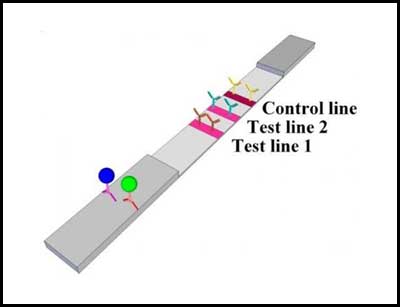- Home
- Editorial
- News
- Practice Guidelines
- Anesthesiology Guidelines
- Cancer Guidelines
- Cardiac Sciences Guidelines
- Critical Care Guidelines
- Dentistry Guidelines
- Dermatology Guidelines
- Diabetes and Endo Guidelines
- Diagnostics Guidelines
- ENT Guidelines
- Featured Practice Guidelines
- Gastroenterology Guidelines
- Geriatrics Guidelines
- Medicine Guidelines
- Nephrology Guidelines
- Neurosciences Guidelines
- Obs and Gynae Guidelines
- Ophthalmology Guidelines
- Orthopaedics Guidelines
- Paediatrics Guidelines
- Psychiatry Guidelines
- Pulmonology Guidelines
- Radiology Guidelines
- Surgery Guidelines
- Urology Guidelines
Paper test strip could help heart failure patients monitor their condition at home

Contrary to the condition's name, heart failure doesn't mean the heart has stopped pumping -- it's just not working at full strength. It can often be managed with medications and lifestyle changes, but its progression needs to be monitored closely. Now scientists have developed a new test strip that could potentially allow patients to do this at home for the first time. Their study appears in the journal ACS Nano.
In the U.S., nearly 6 million people live with heart failure, and about 1 million hospitalizations occur each year are related to the condition, according to the American Heart Association. Closely tracking the condition after diagnosis is important for adjusting treatment and preventing emergency room visits. Antigens called ST2 and BNP are good indicators of heart failure and how it's progressing. But currently, analyzing the levels of these biomarkers requires both trained personnel and sophisticated lab equipment. Feng Xu, Min Lin and colleagues wanted to devise a simple test to enable doctors and patients to carry out the same analysis at the office or at home.
The researchers developed a paper-based test that requires only a small blood sample of 10 microliters. A blue dot glows on the strip if ST2 is present in the sample, and a green dot glows if it contains BNP. The colors' intensities increase with concentration, which indicates a person's heart failure is likely becoming worse. A smartphone app can analyze the readout and send the results to the patient's doctor, who can adjust the patient's treatment accordingly. Testing 38 serum samples from people with heart failure showed that the paper test closely matched conventional techniques.

Disclaimer: This site is primarily intended for healthcare professionals. Any content/information on this website does not replace the advice of medical and/or health professionals and should not be construed as medical/diagnostic advice/endorsement or prescription. Use of this site is subject to our terms of use, privacy policy, advertisement policy. © 2020 Minerva Medical Treatment Pvt Ltd